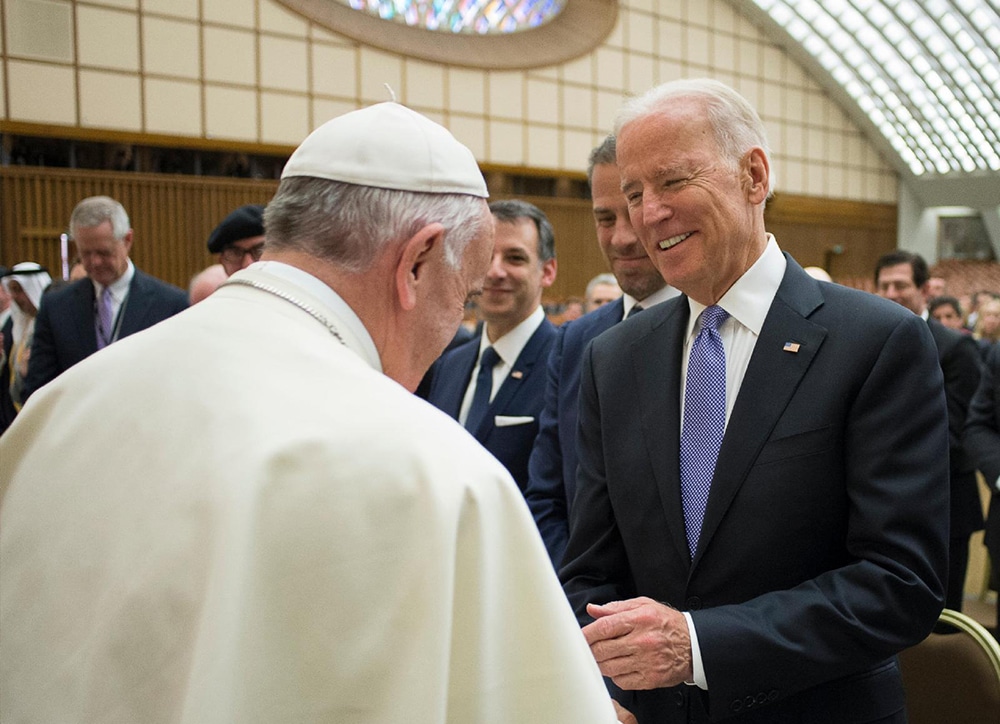President Joe Biden’s meeting with Pope Francis on Oct. 29 will be only the second audience between a pope and a Catholic president of the United States. The first took place on July 2, 1963, when President John F. Kennedy and the newly elected Pope Paul VI met at the Vatican.
In that first meeting, a main point of media debate centered upon the manner of greeting that would take place between the president and the pope. Would President Kennedy show his “Catholic bias” by kneeling and kissing the ring of the Servant of the servants of God, as was the custom for Catholics, or would he forge another path as head of state? After much speculation, the answer was given: a respectful handshake took place between leaders, with plenty of additional cordial exchanges.
During their interview, Kennedy and Paul VI likely talked about world peace amid the nuclear arms race — a critical point of conversation in the early 1960s. Fifty-eight years later, the threat of nuclear war blessedly is no longer driving political discourse. But will abortion, which has taken millions of lives more than those lost at Hiroshima and Nagasaki, be on the table for discussion between the president and the pope? The opening is certainly there.
In a statement to the media, the White House said that Biden and Pope Francis “will discuss working together on efforts grounded in respect for fundamental human dignity, including ending the COVID-19 pandemic, tackling the climate crisis, and caring for the poor.” It is undeniable that those issues are important to the common good and to the future of humanity. They are, also, safe places of convergence between the Democratic Catholic president and the leader of his Church. We sincerely hope that discussion on ending the pandemic, addressing the effects of climate change and caring for the underserved bears great fruit. We also hope that the conversation doesn’t end there. While there are several major poltical and cultural points on which the U.S. president and the Church disagree, there is none bigger than abortion — an issue that goes to the very heart of respect for the fundamental dignity of every person. Is Biden’s radical position on abortion — a position he has not always espoused — something that might find its way into the conversation between head of state and head of Church?
In his encyclical Fratelli Tutti, which celebrates its first anniversary this month, Pope Francis talks about the importance of effective communication. “Approaching, speaking, listening, looking at, coming to know and understand one another, and to find common ground: all these things are summed up in the one word ‘dialogue’,” he wrote. “If we want to encounter and help one another, we have to dialogue. There is no need for me to stress the benefits of dialogue. I have only to think of what our world would be like without the patient dialogue of the many generous persons who keep families and communities together. Unlike disagreement and conflict, persistent and courageous dialogue does not make headlines, but quietly helps the world to live much better than we imagine” (No. 198).
It seems utterly reasonable — if perhaps somewhat idealistic — that, while speaking about the importance of the dignity of all people, the pope could engage the president in a patient and productive dialogue on the issue of abortion. After all, Biden hasn’t always been pro-abortion. He hasn’t always been in favor of having taxpayers pay for abortions. There is common ground from which to begin.
What could such a dialogue produce? At the very least it would offer the opportunity for the second Catholic president in U.S. history and the Roman pontiff to listen to each other — the respectful basis for any deeper relationship of trust and influence. Pope Francis knows the value of such listening, which, as he said in his message on the occasion of the 50th World Day of Communications in 2016, “calls for closeness.”
He added: “Listening also means being able to share questions and doubts, to journey side by side, to banish all claims to absolute power and to put our abilities and gifts at the service of the common good.”
We pray that the conversation between President Biden and Pope Francis will be an occasion of fruitful dialogue and productive listening — and an opportunity to advance a respect for the dignity of all persons at every stage of life.
Our Sunday Visitor Editorial Board: Gretchen R. Crowe, Scott P. Richert, Scott Warden, York Young







